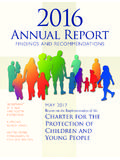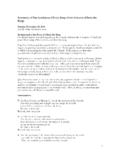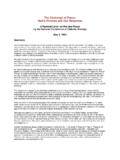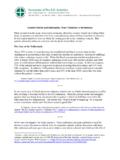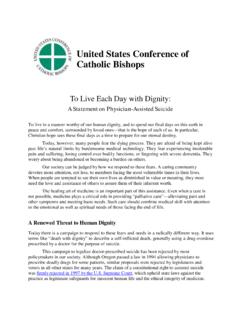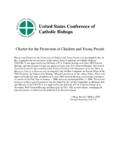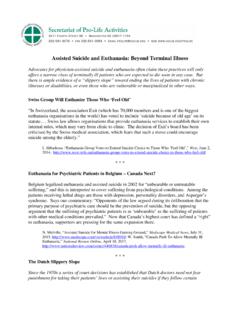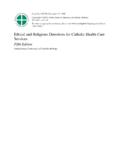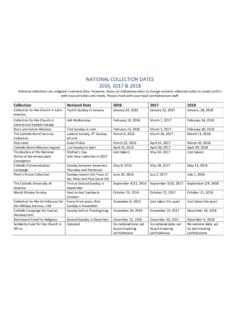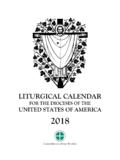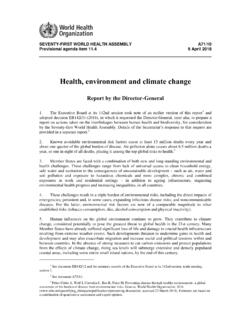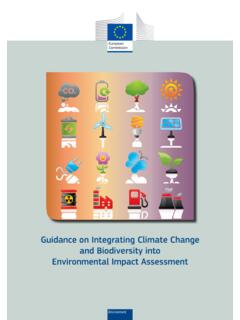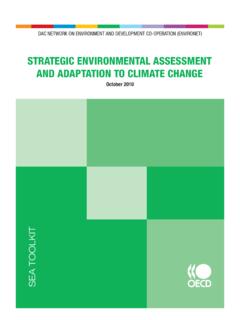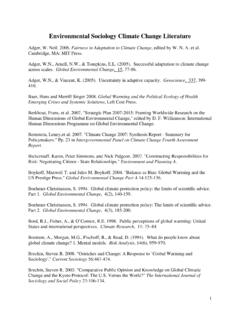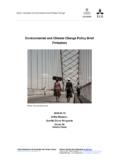Transcription of precisely - United States Conference of Catholic Bishops
1 1 Reflection on climate change and environmental Stewardshipi Most Rev. Thomas G. Wenski, Archbishop of Miami Chairman, Committee on Domestic Justice and Human Development Good afternoon. I am happy to be with you, Catholic leaders and public health officials, to share a day of reflection and conversation on stewardship of the environment and the proposed carbon standards. I thank you for the warm reception and your willingness to be here and participate today. I would like to begin my remarks, and perhaps give some structure to our time, by taking note of an important and common thread for most of us gathered together here. We have chosen to come at the issue of stewardship of the environment from a Catholic perspective. Many of your groups claim an affiliation with our faith, and some of us are explicitly charged with carrying out this work on behalf of the Church.
2 All of us seem to recognize something of importance in a Catholic connection. If this identification with Catholicism means anything for us, we must ask ourselves what that meaning should be. Plenty of organizations advocate for environmental issues; there are no shortage of educational programs and interest groups talking about the environment and climate change . To qualify our work as something Catholic is to consciously or not draw in something unique about our place in the dialogue. If this is true and I think it is then my reflection this afternoon will benefit by an examination of that unique contribution. Indeed, this will serve as the first main theme for our conversation today. From this foundation, I then want to place our dialogue about climate change and the proposed carbon standards within that framework, the framework of a faith-infused approach to stewardship of the environment.
3 I am a Catholic bishop, obviously. You would not be surprised, I imagine, to learn that I am regularly called upon to consider what it means for the Church and her people to engage the world. Our faith is so rich and our social thought so extensive that the Catholic Church has much to say about most everything affecting the human person. Let us pause for a moment and consider that truth. The Church has much to say precisely because so many things in our world affect the human person. As Catholics 2 whether we are speaking about economic issues, immigration, poverty, incarceration or the environment we speak and act because human beings, their well-being and flourishing toward their proper end, hang in the balance. My point may sound simple, but it s worth pondering. The Catholic should care deeply about an effective and efficient economic system that meets the needs of people as much as possible.
4 Even so, the Church s teaching in this area is concerned primarily with the degree to which that economic system is truly at the service of the human person, and the extent to which the economy creates conditions for us to thrive precisely as created daughters and sons, made in the image and likeness of a loving and merciful God. This is why a purely economic analysis of the worth of individuals, or collectivist ideas that leave aside the inherent dignity of the human person cannot fit in a Catholic worldview. Immigration, a present and serious reality in many parts of the world, admits of the same dynamics. A Catholic must care about the security of her nation and the laws that govern the conduct of the people within and among particular States . The Church recognizes this as an important principle, but a principle based on the common good and the reality that security and the reliable enforcement of law help to create conditions for stability and human development.
5 The Church doesn t stop there in her teaching, however. The Catholic should also be concerned with the right of all people to seek conditions that support survival in the face of unbearable threats to livelihood and safety. The Church calls nations to meet the challenges of immigration with mercy, love and justice, recognizing our connectedness as sons and daughters of a loving creator in formulating policy or adapting to immigration crises. Catholic teaching on immigration is clearly centered on the human person and the common good in all its considerations. I don t need to go further down the list of the pressing issues of our day to make my point clearer. In our care of creation, the Church is, not surprisingly, consistent. The Catholic conception of stewardship of the environment is also rooted in the dignity of the human person and his relationship with God.
6 This relationship finds its origin for us, in the beginning. The book of Genesis is meant to draw us into God s creative activity. We should reflect on the Holy Spirit moving mightily over the waters, and God setting into motion powerful and dynamic effects; from nothing an idea we can t even grasp comes a great tidal wave of activity, an unfathomable but ordered, clearly ordered, creation. What must that have looked like, this incredible masterwork of motion and formation? Perhaps we will be granted a glimpse of it in the life hereafter. The inspired Word found in Genesis should capture our attention on another point, too. As God ordered creation, set into motion the laws of nature and adorned the universe with diverse and stunning species, he made our first parents out of the very earth he would set them over as caretakers.
7 Genesis 2:7 tells us that God formed Adam out of the dust of the ground. 3 Adam s body was intimately connected with the Earth. Though God was capable of making him from nothing, he chose to use the materials that he had already created as part of his earlier work to make the first human being. What should strike us about God s choice here is that he intended a clear intertwining and interconnectedness of our physical well-being and the condition of the environment from which we were formed. This foundational concept ties our care for the world to our first moments in history, and we ought not neglect that our responsibilities originate here, at the dawn of time. Our contemplation must not stop at this point, of course. Adam and Eve were not simply created things among many others. When God breathed the breath of life, something of his own spirit, into them, we learn that human beings, unlike other things, were made in [his] image, after [his] likeness (Gen 1:26).
8 It is not by accident that scripture points us to a set-apart mode of creation, to an aspect of the human person that is exalted in the created order. When Adam and Eve were placed in the center of the garden, God saw that his work was very good, indeed. Lest we doubt this, God provides us with a great charge, the basis for our understanding of our role in caring for what has been entrusted to us: .. let them have dominion over the fish of the sea, and over the birds of the air, and over the cattle, and over all the earth, and over every creeping thing that creeps upon the earth. So God created man in his own image, in the image of God he created them; male and female he created them. And God blessed them, and God said to them, Be fruitful and multiply, and fill the earth and subdue it; and have dominion over the birds of the air and over every living thing that moves upon the earth (Gen 1:26-28).
9 At that moment we began to wrestle with concepts of stewardship and dominion. Human beings contended with the careful balance of developing the gifts of the natural order for human thriving with the preservation and protection of those gifts in responsible ways for the good of all people and future generations. These themes are as important for us as they were for Adam and Eve, perhaps more so given the dimness with which we see our place in God s plan after the Fall. In our work for an authentic stewardship of the earth, we must balance these key concepts rooted in our religious belief, in particular stewardship, dominion, and human ecology. Stewardship can seem an elusive term these days. For the Catholic , it often evokes uncomfortable images of the collection basket and the bishop s annual appeal.
10 Still, we really must understand the ecological stewardship God intends for us in order to make our work meaningful. We connect with my earlier point that the Church cares about these matters precisely because the human person and his proper end are in the balance. 4 Stewardship implies a commission to care for something that is not our own. For every gift we receive, be it intellectual, physical, environmental , we are charged to look after it for the good of another. Primarily, all is a gift from God, for his glory and honor; we steward all on his behalf. Secondarily, the gifts entrusted to our care are for the good of human beings according to God s plan, to be cultivated and used responsibly for the development of the human person toward his eternal reward. A critical misunderstanding that can take our stewardship of any gift astray is the idea that the thing stewarded is nurtured for its own sake.
